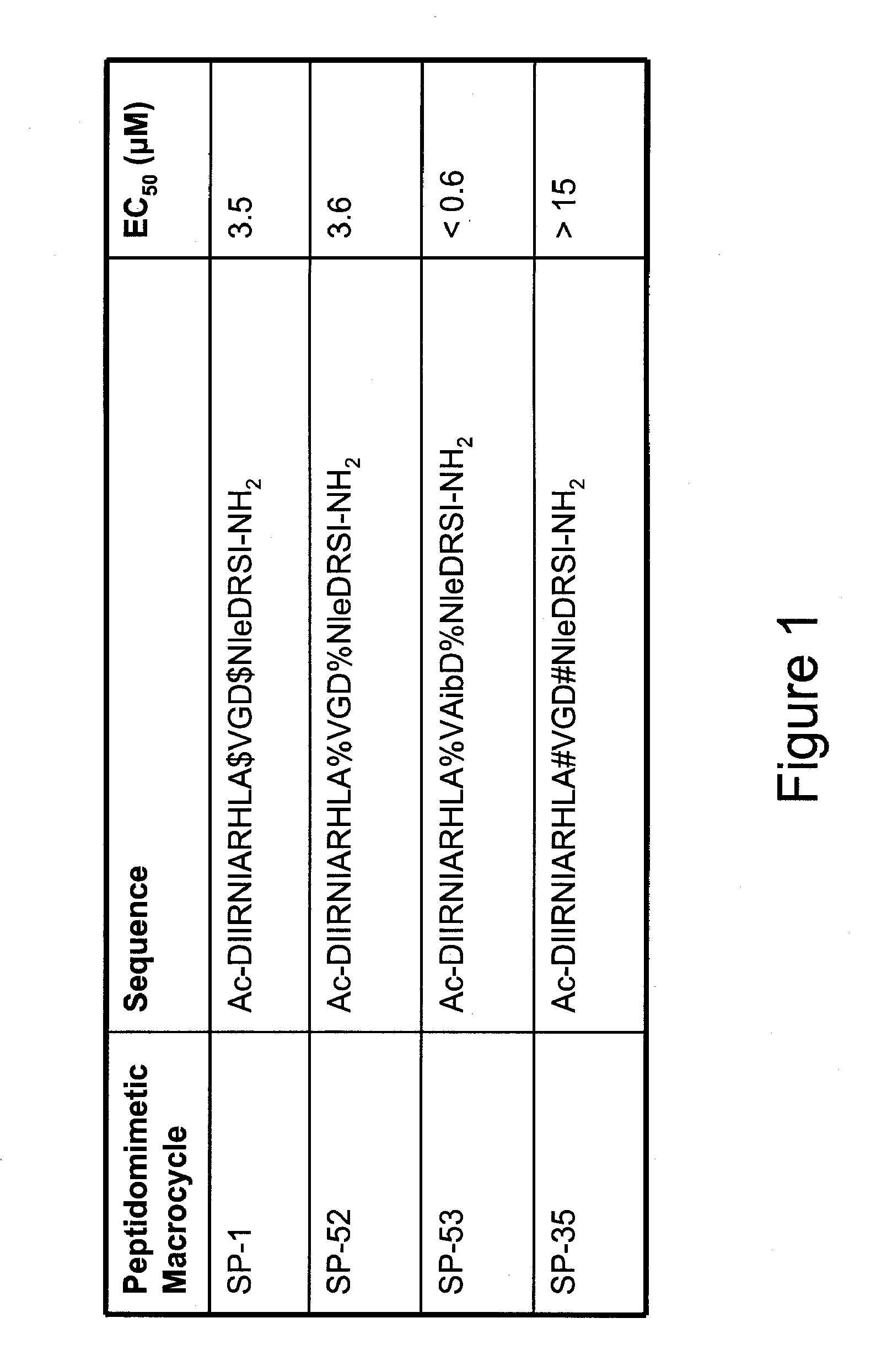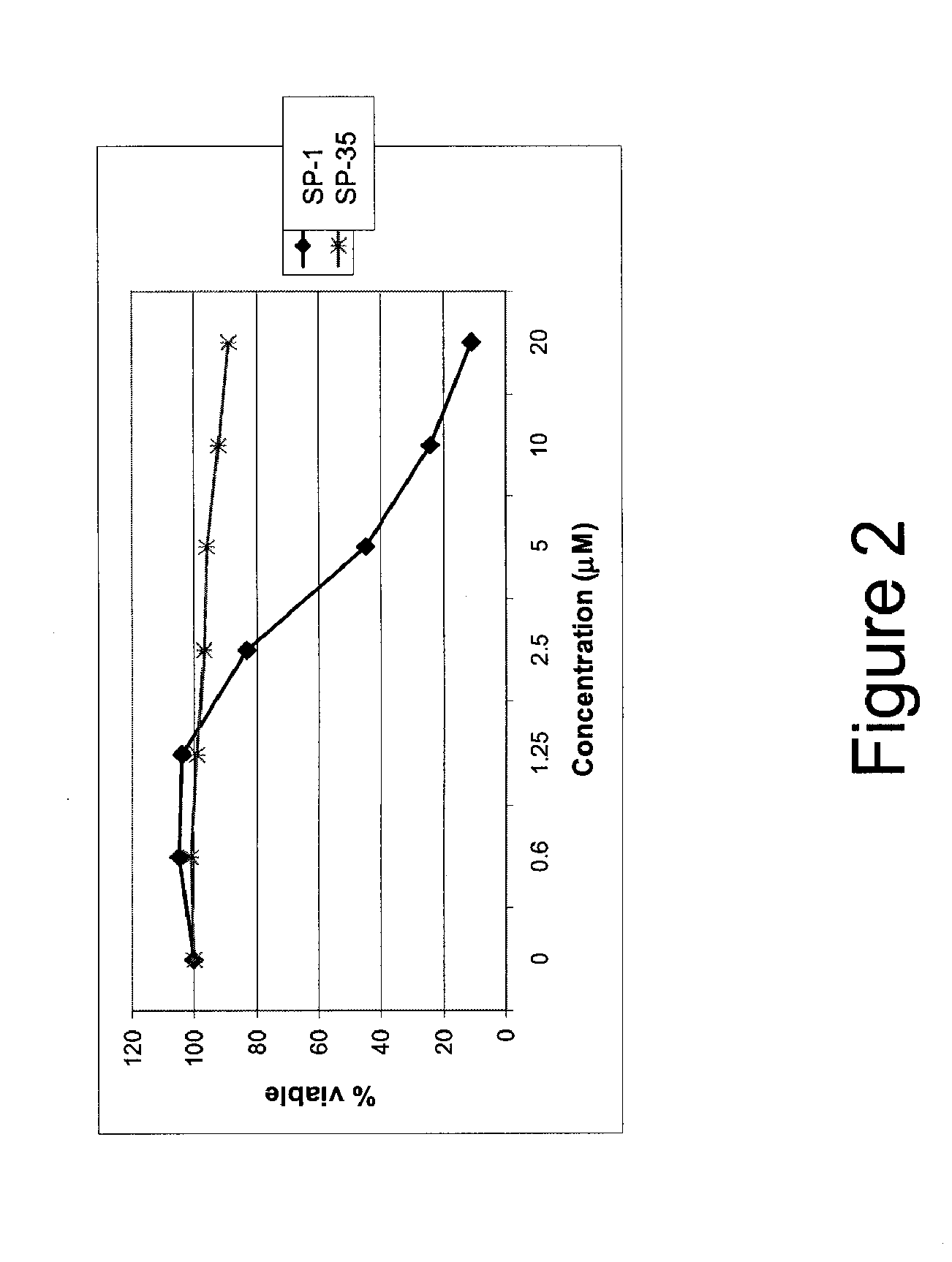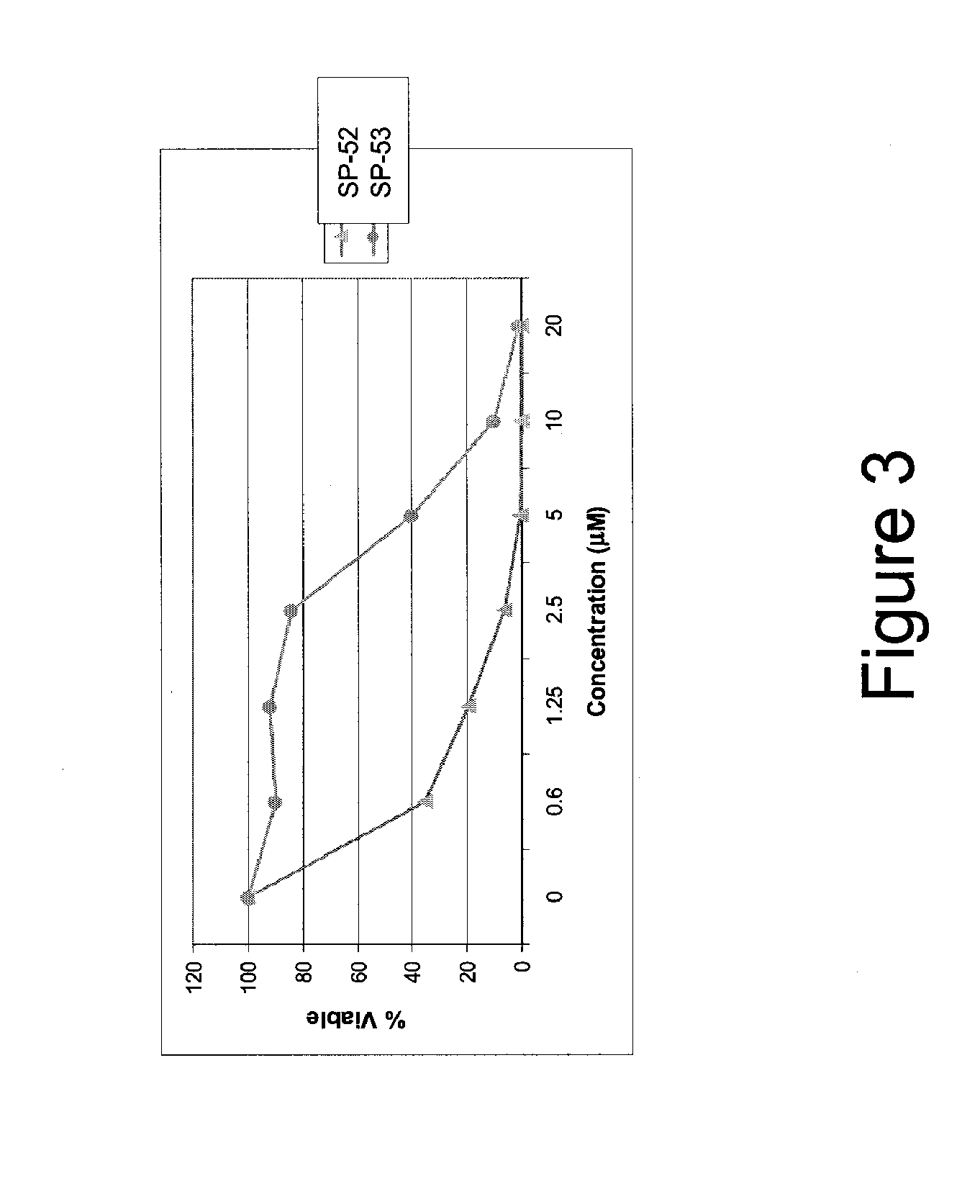Biologically active peptidomimetic macrocycles
a peptidomimetic and macrocycle technology, applied in the field of biologically active peptidomimetic macrocycles, can solve the problems of poor metabolic stability, poor cell penetrability, promiscuous binding, etc., and achieve the effects of improving -helicity, improving biological activity, and increasing cell penetrability
- Summary
- Abstract
- Description
- Claims
- Application Information
AI Technical Summary
Benefits of technology
Problems solved by technology
Method used
Image
Examples
example 1
Preparation of Alpha,Alpha-Disubstituted Amino Acids
[0269]
[0270]1-Azido-n-iodo-alkanes 1.
[0271]To 1-iodo-n-chloro-alkane (8.2 mmol) in DMF (20 ml) was added sodium azide (1.2 eq.) and the reaction mixture was stirred at ambient temperature overnight. The reaction mixture was then diluted with diethyl ether and water. The organic layer was dried over magnesium sulfate and concentrated in vacuo to give 1-azido-n-chloro-alkane. The azide was diluted with acetone (40 ml) and sodium iodide (1.5 eq.) was added. The solution was heated at 60° C. overnight. Afterwards, the reaction mixture was diluted with water and the product was extracted with diethyl ether. The organic layer was dried over magnesium sulfate and concentrated in vacuo. The product 1 was purified by passing it through a plug of neutral alumina. Overall yield: 65%. 1-Azido-3-iodo-propane: 1H NMR (CDCl3) δ: 2.04 (q, 2H, CH2); 3.25 (t, 2H, CH2I); 3.44 (t, 2H, CH2N3). 1-Azido-5-iodo-pentane: 1H NMR (CDCl3) δ: 1.50 (m, 2H, CH2)...
example 2
Synthesis of Peptidomimetic Macrocycles of the Invention
[0318]α-helical BID peptidomimetic macrocycles were synthesized, purified and analyzed as previously described (Walensky et al (2004) Science 305:1466-70; Walensky et al (2006) Mol Cell 24:199-210) and as indicated below. The following macrocycles were used in this study:
SEQCalculatedCalculatedFoundMacro-WTIDm / zm / zm / zcycleSequenceNO:Sequence(M + H)(M + 3H)(M + 3H)SP-4BIM-BH3115Ac-IWIAQELR$IGD$FNAYYARR-NH22646.4306 882.8154 883.15SP-54BIM-BH3116Ac-IWIAQELR#IGD#FNAYYARR-NH22618.3993 873.4716 873.39SP-27BIM-BH3117Ac-IWIAQELR#sIGD#sFNAYYARR-NH22622.3578 874.7911 875.17BIM-BH3117Ac-IWIAQELR#sIGD#sFNAYYARR-NH22622.3578 874.7911 875.10SP-28BIM-BH3118Ac-IWIAQELR$sIGD$sFNAYYARR-NH22650.3891 884.1349 883.97BIM-BH3118Ac-IWIAQELR$sIGD$sFNAYYARR-NH22650.3891 884.1349 884.04SP-29BIM-BH3119Ac-IWIAQELR#c4IGD#c4FNAYYARR-NH22656.3278 886.1145 886.48SP-30BIM-BH3120Ac-IWIAQELR$c4IGD$c4FNAYYARR-NH22684.3591 895.4582 895.81SP-31BIM-BH3121Ac-IWIAQELR...
example 3
Intramolecular (i to i+4 and i to i+7) Side-Chain to Side-Chain Azide-Alkyne Huisgen 1,3-Dipolar Cycloaddition on Peptide Bound on Resin
[0341]The fully protected resin-bound peptides were synthesized on a Rink amide MBHA resin (loading 0.62 mmol / g) on a 0.2 mmol scale. Deprotection of the temporary Fmoc group was achieved by 2×20 min treatments of the resin bound peptide with 25% (v / v) piperidine in NMP. After extensive flow washing with NMP, methanol and dichloromethane, coupling of each successive amino acid was achieved with 1×60 min incubation with the appropriate preactivated Fmoc-amino acid derivative. All protected amino acids (1 mmol) were dissolved in NMP and activated with HCTU (1 mmol) and DIEA (1 mmol) prior to transfer of the coupling solution to the deprotected resin-bound peptide. After coupling was completed, the resin was extensively flow washed in preparation for the next deprotection / coupling cycle. Acetylation of the amino terminus was carried out in the presence...
PUM
| Property | Measurement | Unit |
|---|---|---|
| pH | aaaaa | aaaaa |
| temperature | aaaaa | aaaaa |
| Tm | aaaaa | aaaaa |
Abstract
Description
Claims
Application Information
 Login to View More
Login to View More - R&D
- Intellectual Property
- Life Sciences
- Materials
- Tech Scout
- Unparalleled Data Quality
- Higher Quality Content
- 60% Fewer Hallucinations
Browse by: Latest US Patents, China's latest patents, Technical Efficacy Thesaurus, Application Domain, Technology Topic, Popular Technical Reports.
© 2025 PatSnap. All rights reserved.Legal|Privacy policy|Modern Slavery Act Transparency Statement|Sitemap|About US| Contact US: help@patsnap.com



